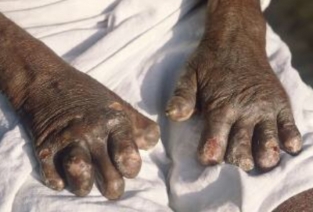 Not a single case of the disease, which is now curable with medications, has been transmitted locally in L.A. in the past 10 years
Not a single case of the disease, which is now curable with medications, has been transmitted locally in L.A. in the past 10 years
By Miriam Raftery
Photo by B. Jehle, Creative Commons license
September 18, 2019 (San Diego) – An article published by the London tabloid Daily Mail and cited by some U.S. media outlets falsely suggested an outbreak of leprosy among homeless in Los Angeles to be an eminent threat. The Daily Mail quoted Dr. Marc Siegel as stating, “'Leprosy appearing among the homeless in LA is a sure recipe for instant public panic.”
But Associated Press has debunked the story. The Los Angeles County Health Department confirms that the rate of leprosy has stayed steady for the past decade, averaging only two cases a year – and none of those were transmitted locally, AP reports. This year, only a single case has occurred.
There are other diseases, such as typhoid fever and hepatitis A, that have been diagnosed in limited numbers in Los Angeles and that city health officials have linked to homeless populations, but not leprosy.
Leprosy, also called Hansen’s disease, is rare in the U.S. Worldwide, about 200,000 cases are diagnosed, with over half of those in India. The bacterial disease affects the skin and peripheral nervous system. Left untreated, it can cause blindness, muscle and bone damage, and severe disfigurement.
In the U.S., some cases are believed to have been transmitted by armadillos – animals not found in California. The disease can take several years from exposure to diagnosis. It is generally transmitted through long-term exposure to a person with the disease, including through coughing and sneezing.
Leprosy is now a curable disease with medications
However, unlike medieval times when lepers were isolated in leper colonies, today there are treatments for leprosy and in fact, leprosy can be cured with multi-drug therapy (MDT), a combination of three antibiotics: rifampin, clofazimine and dapsone.
Treatment can take from six months to a year, sometimes longer.
People are no longer contagious after about one week of MDT, according to a fact sheet published at Leprosy.org.











Recent comments